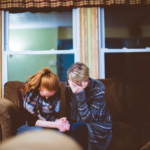According to the Merriam-Webster Dictionary, grief is defined as “ deep and poignant distress caused by or as if by bereavement”. We tend to associate the word grief with death. However, I have noticed that grief can be associated with loss in general. The loss of a job, divorce, ending a friendship, miscarriage, moving or change in general.
Thank you for reading this post, don't forget to subscribe!There is no right or wrong way of managing grief. The disclaimer I always use after this statement though is that as we grieve, we should abstain from hurting ourselves or others physically, emotionally and spiritually. Kübler–Ross has a model for grieving that has been adapted over time but has helped many understand the feelings they are experiencing after a loss. According to Kübler–Ross, individuals experience five stages of grief that can encompass thoughts, feelings and behaviors as an individual processes through their grief. Below is an explanation of each of the stages:
 Denial or Shock
Denial or Shock
According to this model, the first stage that an individual experiences is denial or shock. During this stage, it is very typical for someone to try to make sense of the situation. In plain words, it can feel like a “dream like” state. While often times denial tends to have a negative connotation, this stage helps us survive the traumatic impact of the loss momentarily. We can compare denial to that numbing feeling we get when we get physically hurt as the body releases endorphins to be able to respond and move on.
 Anger
Anger
While many of us tend to cringe at the word “anger”, this emotion is necessary in the healing process. We may get angry at God, friends, family, the aftermath of the loss and often times the deceased during this stage. As a result of a loss, there may be many unanswered questions that can lead us to feel like there’s no closure, like we are abandoned, among many other uncomfortable feelings. Blame can be part of this stage too as we try to connect dots between the loss and our reality. It is ok to feel angry for some time. What is important is for us to not allow our anger to get to a point in which we hurt ourselves or someone else whether is emotionally or physically.
 Bargaining
Bargaining
During the bargaining stage, we tend to make compromises with either God, a cause or another person. It is common to feel like you would trade places with a deceased or wanting to go back in time to change something about the situation that resulted in the loss. During this stage is common to think that we would do anything to not feel the pain of this loss. Guilt can be closely related to this stage as we can start assuming false responsibility for the situation.
 Depression
Depression
Once an individual has processed through the first three stages, he or she may face their present reality. Becoming aware of such reality can lead to feelings of emptiness, hopelessness, loss, sadness and withdrawal. It may hit you when you least expect it. We can compare the depression stage as the sharp pain that comes when the numbing feeling after being hurt fades. These feeling are valid. Though the word “depression” can make some of us wince, it is a helpful part in our path to healing from grief.
 Acceptance
Acceptance
This is the last stage of grief. Acceptance can be confused with “being alright” or “ok” with what happened. However, acceptance is just acknowledging that the loss was real and deciding to continue living despite the loss. There are losses that will never stop hurting. We can compare acceptance to learning to live with chronic pain. Some days the pain feels greater, some days you do not feel the pain at all. However, when we achieve acceptance, we are able to acknowledge the pain and continue moving forward. Acceptance doesn’t mean replacing. If you lost a loved one, that loss is irreplaceable and there is no person in this world that can take that place. Acceptance is learning to readjust, creating new memories, new meaningful relationships, change and growth. We continue living despite the loss.
If you or a loved one has experienced a great loss and is in need of counseling, please contact us at (407) 906-5214 or hopecounselingfl@gmail.com.

